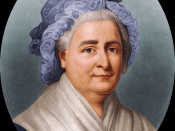In order to answer this question it is essential to know what is meant by the term isolationist. Isolationists define it as "the avoidance of all alliances or participation in world affairs outside the USA in favour of a concentration on the internal prosperity and security of the USA" . Therefore isolation means political rather than economic and in this regard America certainly was isolationist in her thinking but only for certain distinct periods of time, mostly between the two world wars c1919-1939. However an isolationist stance was not unique to this period but dates back to being used as an undefined policy by Presidents like George Washington, Thomas Jefferson and James Monroe. Therefore the idea although prevalent throughout US history, was embraced more openly at particular times. The inconsistency of this policy in foreign affairs is shown by the post war era of internationalism and proves that the US took this stance only when it suited their interests to create loopholes for intervention when they deemed it necessary.
So whether it was "really" isolationist is a whole other debate and will be addressed in this essay.
To understand the extent to which isolationism pervaded US society it is necessary to go back to its roots. It began with the early leaders of the US "endorsing commercial treaties and expansion of trade with other nations, but discouraged political or military alliances" . President George Washington was the first to mention this in his farewell address of 1796 warning against becoming involved in the affairs of Europe. It was echoed by President Thomas Jefferson in 1801 who encouraged friendly relations with all nations but "entangling alliances with none". Another President who stood up for ideals similar to that of isolation was James Monroe, famous for his "Monroe Doctrine" in 1823 which...


